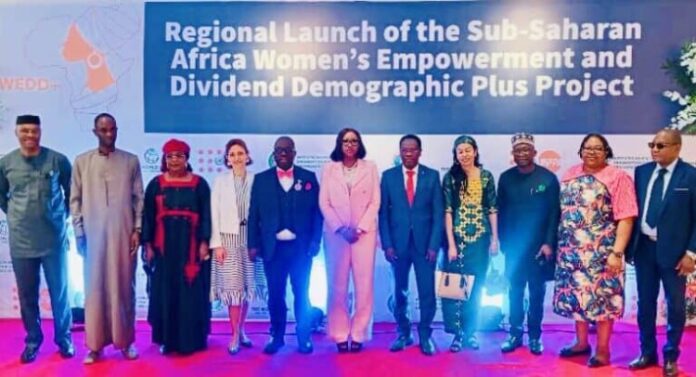Vice-President of ECOWAS Commission, Damtien Tchintchibidja, says about two million West/Central African women and girls have benefited from Sub-Saharan Africa Women’s Empowerment Demographic Dividend plus (SWEDD) project in 10 years.
Tchintchibidja made this known while officially inaugurating a new phase of the project tagged: SWEDD+, on Monday, in Abuja.
SWEDD is a World Bank-sponsored project aimed at promoting inter-regional, inter-institutional cooperation and collaboration for empowering West and Central African women and girls.
According to her, the SWEDD project, funded with 365 million dollars by the World Bank, has transformed the lives of women and girls in five countries in its initial phase.
READ ALSO:
Tinubu appoints eight new Permanent Secretaries
Governor Mutfwang Praises President Tinubu for Renaming University After Gowon, Congratulates First Female Navy Pilot
FG offers free train service during Yuletide
The ECOWAS VP listed the beneficiary countries to include Burkina Faso, Chad, The Gambia, Senegal, and Togo, cutting across West African (ECOWAS) and Central African (ECCAS) subregions.
She described the project as a significant milestone in the collective efforts to unlock the full potential of women and girls in the subregion.
“This groundbreaking initiative SWEDD+ project is building on the success of the previous phases of the project in the Sahel, which are known to have transformed the lives of about two million women and girls in the last decade.
“Women and girls are the backbone of our societies, and for that reason their empowerment is crucial to achieving sustainable development, economic growth, and social progress.
“The demographic dividend offers a unique opportunity for our region to harness the energy, the creativity, and the capabilities of our young people, particularly women.
“By investing in their education, health, and economic empowerment, we can create a virtuous cycle of growth, prosperity, and social cohesion,” Tchintchibidja said.
These, she said, included gender-transformative interventions; the strengthening of health services; as well as policy advocacy and institutional strengthening.
“Women and girls of Sub-Saharan Africa, this project is for you. It is a recognition of your struggles, your resilience, and your aspirations.
“We believe in your potential to drive change, to innovate, and to lead,” she added.
The initiative, which is also supported by the UN Fund for Population Activities, offers a unique opportunity for ECOWAS and the bloc’s leaders to harness the energy, creativity, and capabilities of women and girls.
This entails investing in their education, health, and economic empowerment, with a view to creating a virtuous cycle of growth, prosperity, and social cohesion.
The event was graced by Prof. Fatou Sarr, ECOWAS Commissioner for Human Development and Social Affairs; Mrs Fatima Acyl, representing the Minister of Finance, Economy and Planning of Chad; Dr Sennen Hounton, Director, UN Population Fund Regional Office, West and Central Africa.
Others are Ms Eleonora Cavagnero, Project Team Leader, World Bank; Dr Melchior Aissi, Director General, West African Health Organisation (WAHO) and representatives of the Ministers of Health and Social Affairs of Nigeria, Togo and Senegal, among others. NAN

